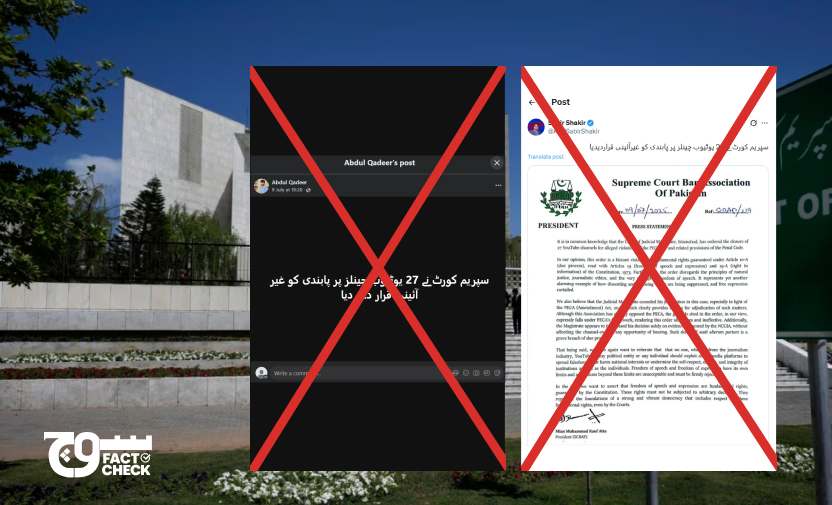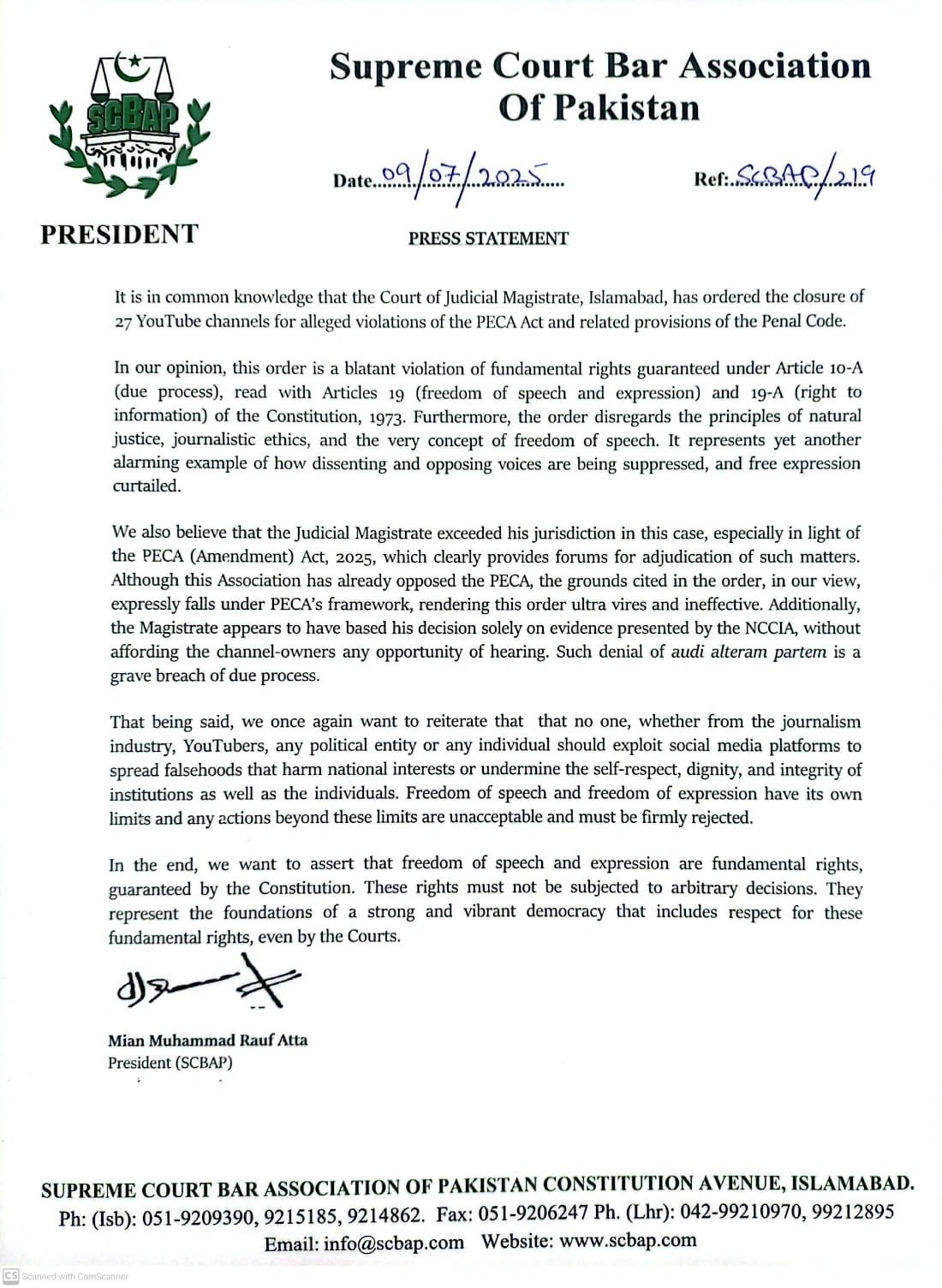
Claim: The Supreme Court of Pakistan declared the ban on 27 YouTube channels unconstitutional.
Fact: The SCP has issued no such declaration. The letter accompanying the claim in some of the viral posts is from the Supreme Court Bar Association (SCBA), an independent body of lawyers, not the Supreme Court itself.
On 9 July, journalist and anchorperson Sabir Shakir shared a letter on X, writing, “سپریم کورٹ نے 27 یوٹیوب چینلز پر پابندی کو غیرآئینی قراردیدیا”
[Translation: Supreme Court declares ban on 27 YouTube channels unconstitutional]

The claim was subsequently shared widely across social media.
Court directs YouTube to block 27 channels
On 8 July, a judge in Islamabad ordered YouTube to block 27 channels for disseminating “fake, misleading, and defamatory” content against the government and armed forces, according to Dawn. The order, issued by Judicial Magistrate Abbas Shah, followed a plea by the National Cyber Crime Investigation Agency (NCCIA), which published a report on 2 June accusing the channels of “sharing highly intimidating, provocative and derogatory contents against state institutions and officials of the state of Pakistan.”
A 24 June court order, seen by Reuters, revealed that the channels targeted for blocking included those of the main opposition party, Pakistan Tehreek-e-Insaf, its jailed leader and former prime minister Imran Khan, as well as journalists and political commentators critical of the government. The sanctioned accounts included Imran Riaz Khan, Sabir Shakir, Matiullah Jan (MJtv), Asad Toor, Wajahat Saeed Khan, Ahmad Noorani, Moeed Pirzada, Orya Maqbool Jan, Aftab Iqbal, Sajid Gondal, Arzoo Kazmi, Sabee Kazmi, Rana Uzair Speaks, Naya Pakistan, Daily Qudrat, Real Entertainment TV, Habib Akram, Naila Pakistani Reaction, Abdul Qadir, Charsadda Journalist, Nazar Chohan, Makhdoom Shahabuddin, Shayan Ali, Siddique Jaan, and Haider Mehdi.
Digital rights campaigners warned that the ban would further undermine free speech in the country. The Human Rights Commission of Pakistan also expressed concern, stating:
“HRCP is greatly concerned by the recent court directive blocking 27 YouTube channels, reportedly following a complaint by the Federal Investigation Agency. The wholesale blocking of entire channels—rather than addressing specific instances of unlawful or hateful speech in accordance with due process—conflates dissent with criminal activity.
The constitutional right to freedom of expression is fundamental not only for individual liberty but also for ensuring government accountability, fostering debate and enabling the public to access a diversity of viewpoints. Any interventions targeting hate speech must be precise and proportionate.”
Fact or Fiction?
Soch Fact Check doubted the authenticity of the claim, as the letter shared by Sabir Shakir was clearly titled “Supreme Court Bar Association” and signed by the President of the SCBAP.
We first searched for news reports from credible outlets reporting that the Supreme Court of Pakistan had declared the Islamabad court’s ban on YouTube channels unconstitutional. However, we did not find any relevant reports.
Soch Fact Check then scoured the Supreme Court Bar Association’s official website and located the press release, which had been published on 9 July 2025. It’s important to note that the SCBA is an independent body comprising lawyers who practice before the Supreme Court. Established in 1989 under the Legal Practitioners and Bar Councils Act, 1973, the SCBA operates under the Pakistan Bar Council. It is not part of the Supreme Court and functions independently.
We also reached out to Ali Javed Darugar, Advocate of the High Courts and partner at PrimeLegalCo for legal insight. He confirmed that the “Supreme Court has given no such declaration.”
Darugar further explained that the Supreme Court can issue such a ruling under the 26th Amendment if it deems a matter important to the enforcement of fundamental rights. However, it is unlikely to do so in this case, he added. The original order was issued under the Prevention of Electronic Crimes Act, 2016, and the law provides other channels for appeal or remedy. A Supreme Court intervention is improbable, even if someone were to petition for it, he reiterated.
Virality
The claim was shared here, here, here, here, and here on Facebook. Archived here, here, here, here, and here.
On X, it was shared here, here, here, and here. Archived here, here, here, and here.
Conclusion: The claim that the Supreme Court declared an Islamabad court’s order to block 27 YouTube channels unconstitutional is false. The letter accompanying the viral posts is from the SCBA, which is an independent body of lawyers, and does not represent the Supreme Court of Pakistan.
–
Background image in cover photo: AP/VOA
To appeal against our fact-check, please send an email to appeals@sochfactcheck.com
